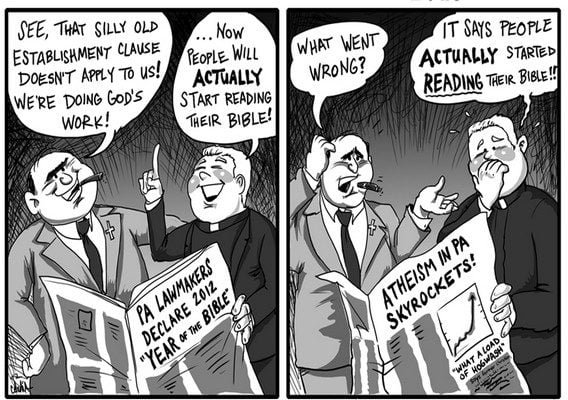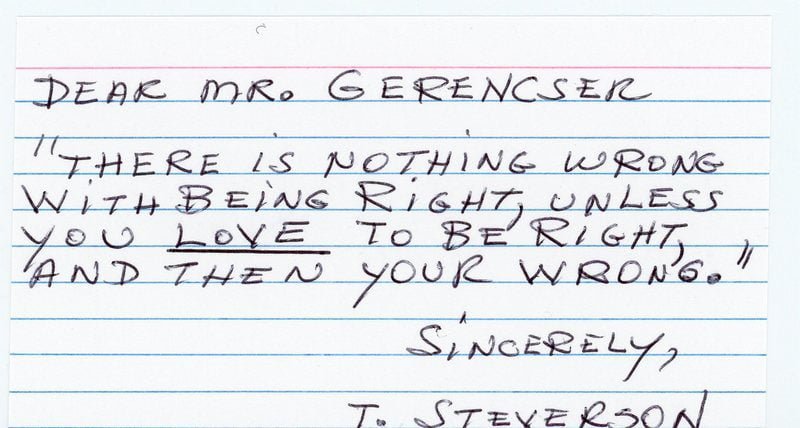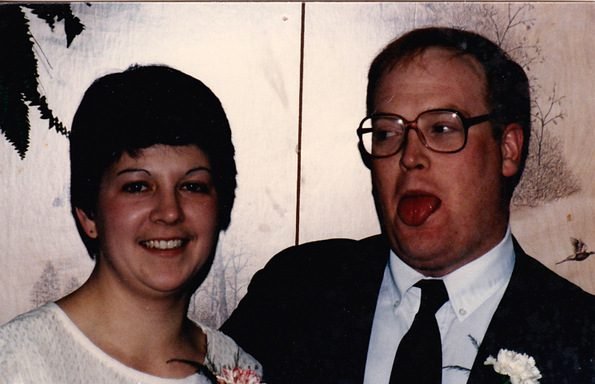
Evangelicals believe they are commanded by God to go into all the world preach the gospel to everyone. Pastors encourage church members to seek out prospective candidates for evangelization everywhere they go. Hell is hot, death is certain, and the return of Jesus to earth is imminent, preachers say, so winning souls for Jesus is their top priority. (Fortunately, most Evangelicals fail to evangelize even one sinner.)
I studied for the ministry at Midwestern Baptist College in Pontiac, Michigan. Midwestern, an Independent Fundamentalist Baptist (IFB) institution, was founded by Tom Malone, a graduate of Bob Jones College and the pastor of nearby Emmanuel Baptist Church. Every day students were required to attend chapel — a 45 minute or so church service. One song that was frequently sung went like this:
“Souls for Jesus!” is our battle cry!
“Souls for Jesus!” We’ll fight until we die!
We never will give in while souls are lost in sin!
“Souls for Jesus!” is our battle cry!
Students lustily sang the words, believing that their highest calling in life was winning souls for Jesus. Students were required to share the gospel weekly with at least three people. Some students, all jacked up on Mountain Dew, would spend hours each week evangelizing “sinners” in the Pontiac area. Others, such as Polly and I, had a life, which included full-time jobs, full-time class schedules, attending church three times a week, going on visitation/bus calling, working in a church ministry, and then, in the few waking hours we had left, have some sort of social life. We “wanted” to win souls. We wanted to be as zealous as other students, but we simply didn’t have enough hours in the day to do so. And we were not alone. Countless students, when called on to give an account of how many people they shared the gospel with, lied or played loose with what it meant to verbalize the gospel to sinners. All told, I won a handful of people to Christ during the three years I spent at Midwestern. I was, by Midwestern’s standard, a soulwinning failure.
As a pastor, I found that most of the people saved under my ministry came to saving faith through my preaching (over 600 people at one church in Southeast Ohio). I continued to knock on doors, hand out tracts, and preach on the streets, but I quickly learned that my most effective evangelization tool was my preaching.
I spent twenty-five years pastoring Evangelical churches in Ohio, Michigan, and Texas. During this time, I came in contact with thousands of people. Two of the churches I pastored had attendances around 200. These two churches, in particular, had lots of visitors. Yet, in all my years in the ministry, I didn’t meet one person who said they were an atheist. Not one. I can’t remember ever preaching a whole sermon on “atheism.” When the text I was preaching from was applicable to atheists, I would mention it in passing, but I never dwelled on the people God called “fools.”
Now that I am a non-Christian, I realize everything I have learned about evangelizing atheists has come from Evangelicals who have tried to evangelize me. What follows is a list of methods Evangelicals have used in their attempts “save” me:
- The God question
- Philosophical arguments
- Creation
- Law of God written on my heart
- Questioning/doubting my story
- Quoting Bible verses
- Sharing personal testimony with me
- Attacking my character and motives
Scores of Evangelicals have tried to reclaim me (or claim me for the first time, depending on their soteriology) for Jesus using one or more of the methods listed above. All of them have failed spectacularly. Of course, Evangelicals never accept blame for their failed efforts, nor do they blame God for his inability to “save” me. No, I am to blame. I have a hard heart. I am a reprobate. I secretly want to sin. I am a closeted homosexual. I refuse to accept the “truth.” However, Evangelicals might want to reconsider their methodology, or better yet, realize that most atheists are not good prospects for evangelization — especially those who were Evangelicals before they deconverted. Atheists are not low-hanging fruit. We are at places in life where we are almost impossible to reach. Yet, Evangelicals continue to try to evangelize me, each thinking he or she is going to be the one who wins the Evangelical-pastor-turned-atheist back to Jesus. What a prize, right?
I know I will never dissuade Evangelicals from trying to “save” me. All I can do is suggest that they come up with better methods than generic God arguments, fuzzy philosophical arguments, presuppositional arguments, quoting Bible verses I have heard and preached on countless times before, calling me a liar, discounting/dismissing my story, besmirching my character, or shitting on my doorstep.
Why not just pray and ask God to save me? Why not leave the state of my nonexistent soul up to the nonexistent creator of the universe? If God is the sovereign Lord of all and knows everything, surely he alone knows if and when I will be saved and what means will best do the job. Why leave my salvation in the hands of people who can’t even agree amongst themselves about “how” a person is saved, whether I need saving, or whether I have committed the unpardonable sin and crossed the line of no return?
Bruce Gerencser, 66, lives in rural Northwest Ohio with his wife of 45 years. He and his wife have six grown children and thirteen grandchildren. Bruce pastored Evangelical churches for twenty-five years in Ohio, Texas, and Michigan. Bruce left the ministry in 2005, and in 2008 he left Christianity. Bruce is now a humanist and an atheist.
Connect with me on social media:
Your comments are welcome and appreciated. All first-time comments are moderated. Please read the commenting rules before commenting.
You can email Bruce via the Contact Form.











